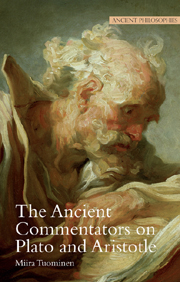7 - Ethics
Summary
When we turn to ethics in the commentaries, we find ourselves in a new situation: none of the main figures discussed in this book wrote a commentary on Aristotle's Nicomachean Ethics that has been preserved to us. Of these authors, we have Ethical Problems attributed to Alexander of Aphrodisias (in CAG Suppl. II 2); it is a discussion of ethical issues based on Aristotle but by no means a commentary on the Nicomachean Ethics. The work contains responses to questions and problems deriving from Alexander's school. It most probably was not penned by Alexander himself but rather by his close associates or students on the basis of debates involving Alexander (see e.g. “Introduction”, Ethical Problems, trans. Sharples 1990). It is unclear whether Alexander himself wrote a commentary on the Nicomachean Ethics (Sharples 1987, 1990).
The only more extensive continuous commentary on the Ethics is from the Aristotelian Aspasius, whose main activity can be dated to the first half of the second century ce. From him, we have a commentary on Books I–IV and VII–VIII, of which the commentary on Book VII is only partial. Aspasius refers to a debate about the authorship of Book VII and the claim that it was not written by Aristotle but by a certain Eudemus, Aristotle's pupil, from the Peripatetic school (Asp. in EN 151, 21–25; Barnes 1999: 20; Natali 2007). Aspasius' commentary has the special interest of being the earliest extant commentary on any work of Aristotle.
- Type
- Chapter
- Information
- The Ancient Commentators of Plato and Aristotle , pp. 237 - 279Publisher: Acumen PublishingPrint publication year: 2009



